The Works of Rev. Philip Doddridge (17 vols.)
Digital Logos Edition
This product has been transferred from Community Pricing to Pre-Pub. The actual funding level may be lower than it appears, which could delay production. The amount of funding still needed will be evaluated and updated soon.
Overview
The Works of Rev. Philip Doddridge contains the 10-volume edition of his collected works, five volumes of his correspondence, plus two biographical works covering the life and work of this deeply pious and influential writer and preacher. Along with Doddridge's masterwork Rise and Progress of Religion in the Soul, this collection includes his popular Life of Colonel Gardiner and A Course of Lectures on Pneumatology, Ethics, and Divinity. Over 50 sermons are included, and they cover such topics as the power and grace of Christ, regeneration, salvation, and more. A prolific hymn writer, almost 400 hymns inspired by the Old and New Testaments are included. Also included is Doddridge's Family Expositor, his beloved Gospel harmony and multi-volume commentary on the New Testament.
- Contains all of Philip Doddridge's major theological works
- Over 50 sermons and almost 400 hymns included
- Includes the Family Expositor, Doddridge's Gospel harmony and commentary on the New Testament
- Five volumes of correspondence, plus his personal diary
- Two biographical volumes on the life and legacy of Doddridge
I know no expositor who unites so many advantages as Doddridge; whether you regard the fidelity of his version, the fullness and perspicuity of his composition, the utility of his general and historical information, the impartiality of his doctrinal comments, or, lastly, the piety and pastoral earnestness of his moral and religious applications.
—Shute Barrington, Bishop of Durham
- Title: The Works of Rev. Philip Doddridge
- Volumes: 17
- Pages: 9,243
- Resource Type: Collected Works
- Religious Groups: Anglican and Reformed
- The Works of Rev. P. Doddridge, vol. 1
- The Works of Rev. P. Doddridge, vol. 2
- The Works of Rev. P. Doddridge, vol. 3
- The Works of Rev. P. Doddridge, vol. 4
- The Works of Rev. P. Doddridge, vol. 5
- The Works of Rev. P. Doddridge, vol. 6
- The Works of Rev. P. Doddridge, vol. 7
- The Works of Rev. P. Doddridge, vol. 8
- The Works of Rev. P. Doddridge, vol. 9
- The Works of Rev. P. Doddridge, vol. 10
- The Correspondence and Diary of Philip Doddridge, vol. 1
- The Correspondence and Diary of Philip Doddridge, vol. 2
- The Correspondence and Diary of Philip Doddridge, vol. 3
- The Correspondence and Diary of Philip Doddridge, vol. 4
- The Correspondence and Diary of Philip Doddridge, vol. 5
- Philip Doddridge: His Life and Labors
- Philip Doddridge, D. D.
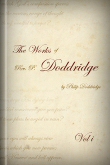
Volume one of the Works of Rev. Philip Doddridge contains:
- Orton's Memoirs of the Life of Dr. Doddridge
- The Rise and Progress of Religion in the Soul
- Christianity Founded on Argument
- An Address on the Importance of Family Religion
Praise for The Rise and Progress of Religion in the Soul
[Issac] Watts encouraged Doddridge to write The Rise and Progress of Religion in the Soul (1745), for which he is best known. This devotional classic of spiritual maturity was instrumental in the conversion of William Wilberforce. It represents the best of experimental piety of earlier Puritans, and its wise and practical guidance can encourage contemporary readers to deepen their lives in Christ.
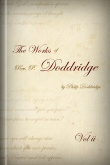
Volume two of the Works of Rev. Philip Doddridge contains:
- Sermons on the Education of Children
- Sermons to Young Persons
- Sermons on the Power and Grace of Christ
- Sermons on Regeneration
- Sermons on the Doctrine of Salvation by Grace through Faith
- Sermon on Christ's Invitation to Thirsty Souls
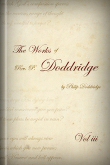
Volume three of the Works of Rev. Philip Doddridge contains:
- Sermons on Public Occasions
- Ordination Sermons
- Funeral Sermons
- Hymns
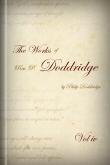
Volume four of the Works of Rev. Philip Doddridge contains:
- Life of Colonel Gardiner
- A Friendly Letter to the Private Soldiers in the Battle of Culloden
- A Dissertation on Sir I. Newton's Chronology of the Evangelists
- A Dissertation on the Inspiration of the New Testament
- Free Thoughts on the Means of Reviving the Dissenting Interest
- Principles of the Christian Religion in Plain and Easy Verse
- Life and Character of the Rev. Thomas Steffe
- A Course of Lectures on Pneumatology, Ethics, and Divinity
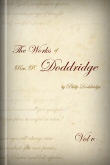
Volume five of the Works of Rev. Philip Doddridge contains:
- A Course of Lectures on Pneumatology, Ethics, and Divinity (Continued)
- Lectures on Preaching and the Several Branches of the Ministerial Office
- Letters on Various Subjects
- A Table of Such Scriptures as Are Illustrated in These Works
- General Index to the First Five Volumes
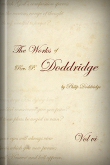
Volume six of the Works of Rev. Philip Doddridge contains the first volume of the Family Expositor, Doddridge's multi-volume commentary of the New Testament intended for family and laity use. Doddridge prepared the first part of the commentary as a harmony, weaving together material from Matthew, Mark, Luke, and John to form one continuous narrative that includes everything in the Gospels. It is compiled in chronological order, and offers a compact and readable glimpse into the life and work of Jesus Christ.
Whilst Philip Doddridge has immortalized himself by his Rise and Progress, he has, also, illuminated many minds and refreshed many hearts by his Expositor of the New Testament. He was a man of good, perhaps rare scholarship for his day.
—Biblical Repository and Classical Review
The concurrent testimony of the most eminent divines have long since raised the Expositor to a distinguished rank among our ablest expository writings. It is justly considered as a model of elegant and candid criticism in the notes. It is a works which can scarcely be recommended too much, or consulted too frequently.
—British Librarian
Few men were so active as well as devout, so amiable in private or so useful in public life, in any country or in any age. His name and influence are known where his sermons are read, his Family Expositor of the New Testament is studied, his hymns are sung, or his Rise and Progress of Religion is leading the soul to God.
—American Baptist Memorial
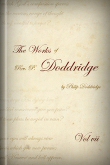
Volume seven of the Works of Rev. Philip Doddridge continues the Family Expositor, Doddridge's multi-volume commentary of the New Testament intended for family and laity use. This volume concludes the Gospel harmony begun in volume six, and contains the first half of Doddridge's study of the Acts of the Apostles.
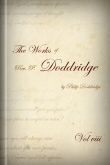
Volume eight of the Works of Rev. Philip Doddridge continues the Family Expositor, Doddridge's multi-volume commentary of the New Testament intended for family and laity use. This volume concludes Doddridge's study of the Acts of the Apostles begun in volume seven, and contains Doddridge's commentaries on the book of Romans and the first part of 1 Corinthians.
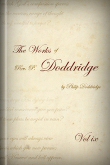
Volume nine of the Works of Rev. Philip Doddridge continues the Family Expositor, Doddridge's multi-volume commentary of the New Testament intended for family and laity use. This volume concludes Doddridge's study of 1 Corinthians begun in volume eight, and contains Doddridge's commentaries on 2 Corinthians, Galatians, Ephesians, Philippians, Colossians, 1 and 2 Thessalonians, and 1 Timothy.
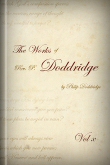
Volume ten of the Works of Rev. Philip Doddridge continues the Family Expositor, Doddridge's multi-volume commentary of the New Testament intended for family and laity use. This volume concludes Doddridge's study of 1 Timothy begun in volume nine, and contains Doddridge's commentaries on 2 Timothy, Titus, Philemon, Hebrews, James, 1 and 2 Peter, Jude, the Epistles of John, and the Book of Revelation.
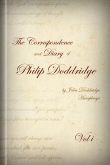
Edited by Philip Doddridge's great grandson John Doddridge Humphreys, the personal letters of Philip Doddridge are arranged in chronological order from 1719–1751. His diary, which serves more as a series of meditations upon the state of his private feelings, also unfolds chronologically. The Correspondence and Diary of Philip Doddridge contains letters from Doddridge to friends, relatives, and colleagues, and discusses theology, personal matters, the church, and much more. Correspondents include Isaac Watts, John Wesley, John Mason, and more. Humphreys has added short biographical information about each correspondent when possible.
Volume one covers correspondence from 1719–1725.
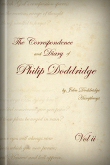
Edited by Philip Doddridge's great grandson John Doddridge Humphreys, the personal letters of Philip Doddridge are arranged in chronological order from 1719–1751. His diary, which serves more as a series of meditations upon the state of his private feelings, also unfolds chronologically. The Correspondence and Diary of Philip Doddridge contains letters from Doddridge to friends, relatives, and colleagues, and discusses theology, personal matters, the church, and much more. Correspondents include Isaac Watts, John Wesley, John Mason, and more. Humphreys has added short biographical information about each correspondent when possible.
Volume two covers correspondence from 1725–1729.
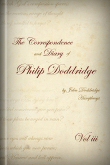
Edited by Philip Doddridge's great grandson John Doddridge Humphreys, the personal letters of Philip Doddridge are arranged in chronological order from 1719–1751. His diary, which serves more as a series of meditations upon the state of his private feelings, also unfolds chronologically. The Correspondence and Diary of Philip Doddridge contains letters from Doddridge to friends, relatives, and colleagues, and discusses theology, personal matters, the church, and much more. Correspondents include Isaac Watts, John Wesley, John Mason, and more. Humphreys has added short biographical information about each correspondent when possible.
Volume three covers correspondence from 1730–1741.
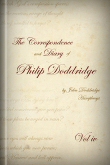
Edited by Philip Doddridge's great grandson John Doddridge Humphreys, the personal letters of Philip Doddridge are arranged in chronological order from 1719–1751. His diary, which serves more as a series of meditations upon the state of his private feelings, also unfolds chronologically. The Correspondence and Diary of Philip Doddridge contains letters from Doddridge to friends, relatives, and colleagues, and discusses theology, personal matters, the church, and much more. Correspondents include Isaac Watts, John Wesley, John Mason, and more. Humphreys has added short biographical information about each correspondent when possible.
Volume four covers correspondence from 1741–1747.
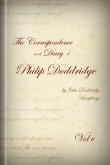
Edited by Philip Doddridge's great grandson John Doddridge Humphreys, the personal letters of Philip Doddridge are arranged in chronological order from 1719–1751. His diary, which serves more as a series of meditations upon the state of his private feelings, also unfolds chronologically. The Correspondence and Diary of Philip Doddridge contains letters from Doddridge to friends, relatives, and colleagues, and discusses theology, personal matters, the church, and much more. Correspondents include Isaac Watts, John Wesley, John Mason, and more. Humphreys has added short biographical information about each correspondent when possible.
Volume five covers correspondence from 1747–1751, and includes the complete diary of Philip Doddridge.
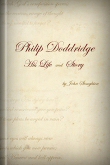
John Stoughton covers the entire life and works of Philip Doddridge: his early days, his public career as a minister, tutor, and author, his social retirement his spiritual life, his last days, and his legacy. Includes an introductory essay by Stoughton, "Dissent in the Reign of William III."
A brief, lively, and, upon the whole, satisfactory view of the character and labors of one of the most interesting and useful ministers that England ever produced.
—The Christian Review
Mr. Stoughton has done full justice to the occasion and to the theme. We are free to say that we have read it with singular gratification, and that we fully share in the writer's hope, 'that it may be the means of inspiring in some cases, of reviving in others, that beautiful, earnest, and practical piety of which Doddridge was so illustrious an example.' We believe that this elegant eulogy, belonging to a class of compositions which we should be glad to see more frequently, is wisely adapted to these ends, and we anticipate for it a large circulation and enduring popularity.
—Eclectic Review
This is an elegant and rather extensive sketch of the leading circumstances in the life of a man of considerable talent and much eminence among the Congregational order of Christians in England.
—Merchants' Magazine and Commercial Review
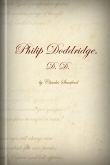
The life and work of Philip Doddridge is brought to light in a full and satisfying way with Charles Stanford's biography. From his early life, to his later years as an esteemed author and preacher, Stanford paints a picture of a deeply pious man whose work and teachings touched more than a few.
Doddridge's name is a household word among us, but few know much about his personal history. This little volume gives full details of his life, and shows him to have been one of the foremost and best men of the last century.
—The Presbyterian Review
St. Stanford's sketch of Doddridge is in every way admirable. It is crisp, quaint, picturesque, scholarly, wise, and full of tender grace and sympathy. Succinctly, and yet sufficiently, it touches every point with penetrating instinct, and with a range of information that constitutes a fitting setting. It is a striking illustration of quiet goodness. A more striking piece of biography has not latterly been done.
—The British Quarterly Review
The story of the life and life-work of Doddridge is told by Dr. Stanford with felicitous grace and extraordinary animation. The romance and the conflict of the life, the delicate culture and high breeding of the man, and the various results of his sanctified intelligence and consecrated sense, are delineated with subtle tact and fine feeling.
—Evangelical Magazine
Dr. Stanford has produced one of the most charming biographies it has ever been our privilege to read. It is interesting from the first page to the last.
—Evangelical Magazine

Philip Doddridge (1702–1751) was born in London and educated at the Dissenting academy at Kibworth in Leicestershire. In 1723 he became the first principal of the Daventry Academy and started his pastorate of an independent congregation at Northampton. His popularity and influence grew with the help of his memorable sermons and successful books, and he maintained a circle of influential independent religious thinkers and writers, including fellow Dissenter Isaac Watts. He was a prolific writer, penning over 400 hymns, plus publishing tracts, sermons, books, essays, and more. In 1736, King's College and Robert Gordon's College, both in Aberdeen, awarded Doddridge a Doctorate of Divinity for his theological contributions.
The academy he started would later be formed into New College, London, and almost 300 hundred years later, the church he pastored for more than 20 years is still unofficially known as "Doddridge Church" and is located on Doddridge Street, Northampton.
Customers also bought
The Works of John Gill (19 vol...
$99.99$99.99The Complete Works of Thomas M...
$99.99$99.99The Speaker's Commentary (13 v...
$455.95$119.99The Works of John Brown of Had...
$149.95$99.99
Reviews
3 ratings

William Emberley
8/31/2022

abondservant
3/18/2013
They really ought to include that Edwards and Spurgeon both used this commentary set.
Liam
3/4/2013
Doddridge's NT commentary the "Family Expositor" is contained in this set. This was the commentary that Jonathan Edwards used most. Edwards' Blank Bible is littered with all kinds of quotes from Doddridge's Family Expositor. The Expositor is an amazing work. It is a paraphrase of the NT with study notes. Essentually it's the puritan version of a study Bible. Spurgeon also speaks highly of this commentary: "I know no expositor who unites so many advantages as Doddridge; whether you regard the fidelity of his version, the fullness and perspicuity of his composition, the utility of his general and historical information, the impartiality of his doctrinal comments, or, lastly, the piety and pastoral earnestness of his moral and religious applications." If you're in to the old Puritan style commentaries, you wont be dissapointed with this set.